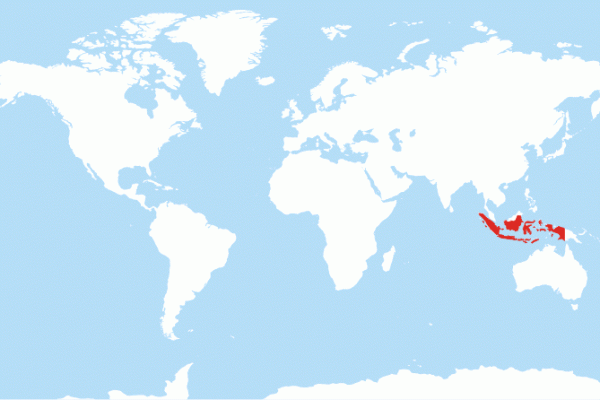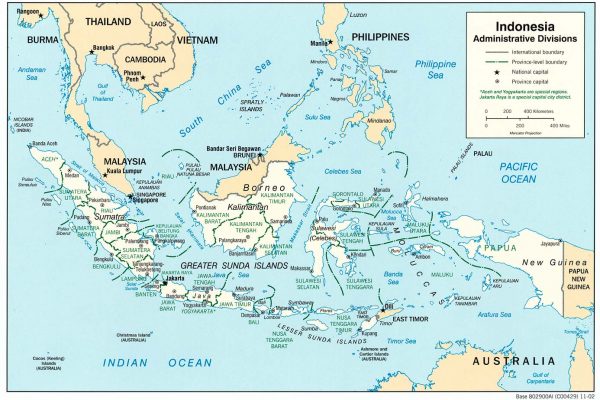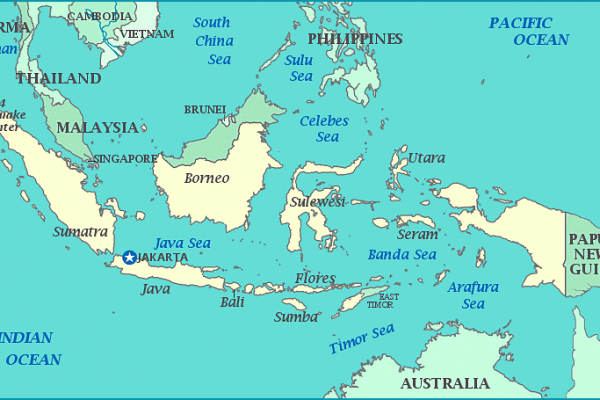Republic of Indonesia, or shortly called Indonesia, is the world’s largest archipelago. Located strategically between Asia and Australia and also Pacific and Indian Oceans, Indonesia has been one of the most important trade hubs in the region. Jakarta is the capital of Indonesia, which is also one of the most important harbors in Asia. With 17.508 islands, Indonesia has a lot to offer, from white sand beaches to amazing coral reefs. Being located at the ring of fire, Indonesia has some of the world’s most active volcanoes. Indonesia is also one of the richest countries in term of natural resources, varying from mining resources to endemic animals. Having over 250 million of population, Indonesia is the fourth most populous country in the world.
The islands of Indonesia has been inhabited since the prehistoric era, dates back to the era of Pithecantropus Erectus (upright apeman), which is also known as the eldest inhabitants in the region. In purpose of trading and commercial affairs, the merchants from Indian and Chinese kingdom came to the islands to build relations with local kingdoms. Sriwijaya, Majapahit, and Samudera Pasai were among the big kingdoms that ever existed in the islands, which now is known as Indonesia. Among the heritages of those kingdoms were Borobudur that was built in the 8th to 9th century by Syailendra Dynasty of Mataram Kingdom in Central Java, and also Prambanan Temple that was built by Rakai Pikatan of Sanjaya Line.

The islands are rich of natural resources, including spices which attracted foreign power to colonized this region. Indonesia has been colonized by the Dutch for about 35o years and by the Japanese for about 35 years. Indonesia declared its independence on August 17, 1945 in Jakarta, under the name of Republic of Indonesia. Soekarno was the first president of Indonesia, as well as one of the declarators of the independence.
Located in the equator, Indonesia is a tropical country that only has two seasons; dry season and rainy season. Dry season usually occurs from June to September and the rest is rainy season. During rainy season the weather is still sunny in the afternoon, and cloudy and rainy in the morning and evening. Being blessed by abundant sunshine, Indonesia’s climate can be very hot and humid. Thus, sun screens and moisturizers are essentials for travel in Indonesia.


Geographically Indonesia is located in South East Asia, sharing land border with Malaysia and Papua New Guinea, and sharing sea border with Singapore, Malaysia, Australia, and The Philippines. Indonesia has over 17.000 islands and have 5 main islands which are Java, Sumatera, Kalimantan / Borneo, Sulawesi / Celebes, and Papua. Indonesia has 3 time zones, which are Western Indonesia Timezone (or WIB, consists of Sumatera, Java, Central Kalimantan, and West Kalimantan), Central Indonesian Timezone (or WITA, consists of the rest of Kalimantan, Sulawesi, Bali, NTB, and NTT), and Eastern Indonesian Timezone (or WIT, that consists of Maluku and Papua).

Indonesia is located at the ring of fire, where some of the world’s most active and deadliest volcanoes, such as Krakatau, Tambora, Karangetang, Rinjani, Merapi, Semeru, and Sinabungare located. Indonesian volcanoes have interesting types and characteristics, varying from shield volcano, cinder cone, to composite volcano.
Indonesia is a democratic and multiparty presidential republic. The president acts as the head of the state and the head of the government. As a unitary state, Indonesia has a centralized government that includes 34 provinces. Indonesia has undergone major political reform after the resignation of former president Soeharto in 1998, that led Indonesia to have its first direct election in 2004. Susilo Bambang Yudhoyono (SBY) was Indonesia’s first directly elected president. Indonesia is now the third largest democratic country in the world.
Based on a 2010 statistical survey, Indonesia has over 250 million of total population, making it the fourth most populous country in the world. Indonesia consists of more than 300 ethnic groups, with Javanese being the majority (40%), and Sundanese comes second (15.5%). The majority of Indonesian people (around 87%) are muslims, but there are also notable number of Christians (7%), Roman Catholics (2.9%), Hindu (1.7%), Budhists, Confucians, or other believes believers. Indonesia is also well known as the biggest muslim country in the world, in term of the number of population.
The official language of the country is Indonesian or locally known as Bahasa Indonesia. There are also around 700 languages and dialects that are spoken in the country. English is taught in schools, but still considered as foreign language. With the increasing education level and the high demand, Indonesian youths speak English pretty well nowadays.
Indonesia has a long history of cultural evolution. Started by local believes as well as animism, Indonesian culture has been continuously evolving from stone age to bronze civilization to modern civilization. Islam came to Indonesia at the 13th century, brought by the merchants from Persia and India. Throughout history, other religions like Buddhism, Hindu, Confucianism, Catholicism, and Christianity came to Indonesia with the merchants from China, as well as with the colonialist from Portugal and The Netherlands. Those religions gave influence to the evolution of Indonesian culture.
Being muslim majority country and influenced by oriental traditions, Indonesian people mostly are still relatively modest. Shoulders and legs covering clothes are still expected, especially when you enter religious sites. However, Indonesian people are well known for their welcoming nature and for being polite, friendly, helpful, and optimistic. Indonesians really respect elder people, thus kissing someone’s hand is a common sight all over Indonesia, especially in Java. Shaking hand is also a common salutation gesture. Indonesians also don’t call someone’s name directly if he/she is older, to show some respect. Instead, Indonesians use some calling title, such as Pak (Mr./Sir), Bu (Ma’am), Mas/Abang (older brother), and Mbak/ Kakak (older sister) before someone’s name.
Most of the government offices in Indonesia are closed on Saturday and Sunday. However, there are also some religious and national public holiday, in which at most cases, the public service is also closed. The biggest festivals and holidays in Indonesia are Idul Fitri, Idul Adha, Nyepi, Christmas, And Vesakh. During Ramadhan, most of Indonesian people do fasting, thus many restaurants are closed. At the end of Ramadhan month, or before Idul Fitri, Indonesian people usually come to their hometowns, making heavy traffic throughout the country, especially in Java.
Nyepi is religious festivities in Bali when people are not allowed to lit the light, to talk too much, or to go outside of their home riding vehicle. During Nyepi most of public services in Bali are closed. Being one of the biggest Buddhist temples in the world, Borobudur Temple near Yogyakarta has always been used as the venue for Vesakh celebration ceremony. The Buddhist rituals usually are followed by the release of lantern, which attracts a lot of tourists to witness this ceremony.
Beside religious ceremonies, Indonesia also has a lot of cultural festivals that are not public holidays, such as Yadnya Kasada ceremony, held once in a year by Tengger tribe around Mt. Bromo, usually on June or July. There is also Tengger festival, held once in a year around Yadnya Karo in Ranupane, on the slope of Mt. Semeru.
Jember Fashion Carnival in Jember, East Java, Malang Tempo Doeloe (the old Malang) festival in Malang, East Java, and also Sail Komodo festival in Flores islands, East Nusa Tenggara are among other contemporary festivals.
 Given multi-ethnics and multi-religions nature, the Republic of Indonesia has a national motto that derives from Sanskrit language ; Bhinneka Tunggal Ika, which means Unity In Diversity. This motto means that even though the people are ethnically or religiously different, we are one; Indonesia.
Given multi-ethnics and multi-religions nature, the Republic of Indonesia has a national motto that derives from Sanskrit language ; Bhinneka Tunggal Ika, which means Unity In Diversity. This motto means that even though the people are ethnically or religiously different, we are one; Indonesia.
Indonesia is one of the richest countries in term of biodiversity. Indonesia has the most endemic animals and flora, only second to Australia, such as single horn rhino, orangutan, cenderawasih bird, komodo, and babi hutan, to name a few. Indonesia also has lots of endemic flora, such as edelweiss, several species of orchids, and Rafflessia Arnoldi to name a few. According to Wallace, the fauna of Indonesia is divided into 3 categories, which are Asian, Australian, and transitional. Asian-zone animals who live in western Indonesia mostly are big mammals, such as rhino, elephant, and orangutan. The Australian-zone animals who live in eastern Indonesia mostly are colorful birds and some species of Kangaroo. The transitional zone animals who live in central Indonesia mostly are some specific animals such as anoa and babi rusa (horned wild pig). Indonesia also has lots of beautiful coral reef and fishes, also manta and whale shark, making it one of the most favorite world class diving spots.
To preserve these unique flora and fauna Indonesian government has designated more than national parks throughout the country, covering both land and sea. Those national parks offer various eco tourism opportunities, as well as botanic gardens and zoos.
Indonesian foods are varied, but mostly are spicy, and influenced by Chinese, Indian, Middle-Eastern, and European cuisines. Rice is the main staple, but people in eastern Indonesia also consume Papeda that is made of sago palm flour. People in Indonesia loves to add sambal (traditional chili sauce) to their dishes. And eating with hand is still common practice in Indonesia.
Almost every region in Indonesia has their own signature dish. Rendang, meat simmered in spices and coconut milk, is signature dish from Sumatera. Rawon, sate, nasi pecel, soto, gado – gado, kare, ikan bakar, are among Indonesian signature dish that you need to try.
Indonesian currency is Indonesian Rupiah (Rp or IDR), which roughly equals to IDR 13.000,-/USD and IDR 14.000,-/EUR. USD, EUR, SGD, Malaysian Ringgit, are not commonly used in Indonesia, but are generally accepted in local money exchange counters. Reputable local banks also accept foreign exchange. However, local banks usually only accept notes that are in almost perfect conditions. Coins and folded, torn, dirty, and old notes are generally not accepted.
Credit card is widely accepted in big cities in Indonesia, and cash is the only acceptable mean of payment in smaller towns and villages. ATM machines for banks with Cirrus, Maestro, and Mastercard links are widely available throughout Indonesia, but getting hardly found in smaller towns and villages. The amount of money that can be withdrawn from ATM machines is between IDR 1250000 to IDR 2500000 (equals to USD 200) per card/day for foreign banks, but it depends on each bank’s policy
Here we compiled some useful information before your departure to Indonesia :
Passport And Visa
Every traveler who wishes to visit Indonesia has to have a passport that is valid for 6 months from the date of arrival and has to obtain a visa at Indonesian diplomatic mission in their country, unless his/her country of origin is eligible for visa on arrival or are exempted from obtaining a visa.
As of March 2016, there are now 169 countries that are eligible to receive 30 days free visa on arrival, which include these following countries :
Visa On Arrival
In accordance with the Regulation of Minister of Law and Human Right of the Republic of Indonesia Number 26, 2013, citizen from 61 countries and 1 region are eligible for obtaining Visa On Arrival (VOA). To see the list of eligible countries please go through this link of Indonesian Ministry of Foreign Affairs here.
The general requirements for Visa On Arrival (VOA) are:
The applicant’s passport must be valid for at least 6 (six) months from the date of entry.
Round-trip airplane ticket.
VOA fee:
USD 35, with the length of stay of 30 days. It is extendable for up to 30 days with additional visa fee. Applicable for all types of passports, but inapplicable for journalism purposes.
Overstaying your visa
Overstaying without the proper authority is a serious matter and visitors can be held in detention or refused permission to leave the country until a fine of Rp. 300,000 per day is paid. After overstaying for 60 days, you will be detained and possibly imprisoned.
Custom Declarations
Every person who enters Indonesian entry points must declare the goods they bring. All hand carried bags must be inspected through scanner at the customs inspection gates.
Goods Subject to Import Duty, Import Related Taxes, and Excise :
• Passenger’s personal goods with customs value exceeding FOB USD 250.00 for each person or FOB USD 1,000.00 for a family. If the values of goods carried are more than aforementioned amount, the passenger shall pay import duty and other import levies for the difference.
• Excisable goods of adult passenger’s personal goods with amount exceeding 200 pieces of cigarettes, 25 pieces of cigars or 100 grams of minced tobacco and 1 liter of alcoholic beverages.
• Goods of crew of means of transport with customs value exceeding FOB USD 50.00 for each arrival.
• Excisable goods of crew of means of transport with amount exceeding 40 pieces of cigarettes, 10 pieces of cigars or 40 grams of minced tobacco and 350 milliliters of alcoholic beverages.
If the values of goods carried by passenger or crew are more than the aforementioned number, the passenger shall pay import duty and other import levies for the difference. However, goods such as camera, video camera, radio cassette, binocular, laptop, or cellular phone, that will be used during stay in Indonesia and will be brought back when leaving for Indonesia will be exempted.
Goods Subject to Declare :
• Imported goods subject to import duty, import related taxes, and excise
• Animal, fish, and plant including their derivative products;
• Narcotics, psychotropic, drugs, fire arms, air guns, sharp weapons, ammunition, explosive material, pornographic goods/publication;
• Cinematographic movie, recorded video tape, video laser disc, or pornographic record;
• Bank notes, in rupiah or other currency with value of Rp. 100,000,000.00 (one hundred million rupiah) or more;
• Commercial goods.
Goods subjected to import duty, import related taxes, and excise that do not have valid approval from authorized institutions in Indonesia may be confiscated, and the carrying person will be prosecuted according to Indonesian law.
Concealment, evasion of goods from inspection, or giving false declaration to the Customs and Excise officials will be regarded as violations and be prosecuted according to Indonesian law.
Travel Insurance
Some national parks in Indonesia provide insurance with limited coverage along with the purchase of the entrance tickets and some don’t at all. Thus, having a personal travel insurance is compulsory for undertaking any tour. It should provide adequate protection for the full duration of the tour to cover personal injury, death, medical expenses, repatriation expenses, rescue, and adequate cover for baggage.
Health And Safety Measures
Taking precautions and preventive measures before traveling to Indonesia is a must. Taking vaccines or oral preventive medications for tropical diseases like malaria is suggested before entering Indonesia. Mosquito and insects repellent bracelet or lotions are essentials for travel in Indonesia. When in Indonesia, always drink bottled water and eat hygienic foods. Some stomach upsets may occur due to different type of foods (we have lots of spicy foods!), thus bringing from-the-counter medicine for diarrhea is useful. Pharmacy and international standard hospitals are available in major cities. Smaller drug stores and health clinics also available in smaller town or villages. Always bring your personal medication as first aid when you travel to Indonesia.
Indonesia is safe for travelers. The rate of violent crimes against tourists is low in Indonesia, so you don’t need to worry about the safety. Using common sense and being alert all the time will be enough to stay safe in Indonesia.
Indonesian Railway Company
Garuda Indonesia Airlines
Expedia, an online booking website
Tiket.com, a booking platform website
Visa On Arrival
List of Foreign Embassies In Indonesia
World Nomads Travel Insurance
Disclaimer : please note that we are not affiliated with the companies listed above, nor we get any commissions from them in any means or forms. The content of those websites solely rely on their administrators, and we only share the information contained in those websites by providing the links. This list is made in order to help our clients on their travel in Indonesia.
The Three Magic Words
As a survival matter while traveling, these three magic words will help a lot and absolutely work like magic!
| Please! | Tolong! |
| Sorry! / Excuse Me! | Maaf! / Permisi! |
| Thank you! | Terima kasih! |
Question Words
| What? | Apa? |
| Where? | Di mana? |
| When? | Kapan? |
| Who? | Siapa? |
| Why? | Mengapa? / Kenapa? |
| How? | Bagaimana? |
Greetings / Sapaan
As many guide books or travel websites have said : Indonesians are warm-hearted and friendly people. Please be ready to expect any courteous attitude during your trip. People will love to say hello to you, and yes, smiles are in everyone’s face. Shaking hand is common thing to do to greet people. Anyway, giving or receiving something using your left hand will be considered as rude and impolite action. Left hand is considered unclean in Indonesia, and you know why.
| Hello | Halo |
| Good morning | Selamat pagi |
| Good afternoon | Selamat siang |
| Good evening | Selamat sore |
| How are you? | Apa kabar? |
| Selamat pagi | Baik, terima kasih, bagaimana dengan Anda? |
| Good bye! | Sampai jumpa! |
| Thank you! | Terima kasih |
| You’re welcome! | Sama-sama |
Numbers / Angka
| One | Satu |
| Two | Dua |
| Three | Tiga |
| Four | Empat |
| Five | Lima |
| Six | Enam |
| Seven | Tujuh |
| Eight | Delapan |
| Nine | Sembilan |
| Ten | Sepuluh |
Money Talks
It is a bit confusing if we talk about price in Indonesia, since our exchange rate is relatively low, compared to USD or Euro. In rough conversion, 1 USD equals to IDR 13000 and 1 Euro equals to IDR 14000. So please do the math when buying things, to avoid any scam.
| One hundred | Seratus |
| …. hundred | …. ratus |
| One thousand | Seribu |
| ….. thousand | …. ribu |
| …. hundred thousand | …. ratus ribu |
| …. million | …. juta |
Buying Things
Department stores or fancy shopping malls with fixed price tag can be easily found in big cities in Indonesia. However, street vendors are open for bargain. These phrases may help you on getting the things you want in better price.
| I’m looking for… | Saya sedang mencari … |
| How much is it? | Berapa harga (barang) ini? |
| This one | Yang ini |
| That one | Yang itu |
| No, thanks | Tidak, terima kasih |
| It’s too expensive | Ini terlalu mahal |
| Less expensive? | Lebih murah? |
| Genuine | Asli |
| Leather | Kulit |
| Cotton | Katun |
In the Hotel
| My room number is… | Nomor kamar saya… |
| Towel | Handuk |
| Can I have a new towel? | Boleh saya minta handuk baru? |
| Bedding sheets | Sprei |
| Blanket | Selimut |
| Soap | Sabun |
| Shampoo | Sampo |
| Hair dryer | Pengering rambut |
Eating Out
In some touristic places, it is easier to find “western” style restaurant with western menus and eating traditions. However, in most of local restaurants in Indonesia, we do not use knife. We mostly use spoon and fork to eat.
Is this restaurant open yet? Apakah restoran ini sudah buka?
| Open | Buka |
| Closed | Tutup |
| Waiter / Waitress | Pelayan (literal meaning), but we usually call them “Mbak” for the waitress and “Mas” for the waiter |
| Hot | Panas |
| Cold | Dingin |
| Spicy | Pedas |
| Not too spicy, please! | Tolong jangan terlalu pedas |
| Salt | Garam |
| Pepper | Merica / lada putih |
| Plate | Piring |
| Coffee | Kopi |
| Tea | Teh |
| Mineral Water | Air mineral |
| Icu cube | Es batu |
| Beer | Bir |
| Sugar | Gula |
| Without sugar | Tanpa gula |
| Meat | Daging |
| Beef | Daging sapi |
| Pork | Daging babi |
| Chicken | Daging ayam |
| Rice | Nasi |
| Could I have more rice, please? | Boleh tolong tambah nasi? |
| Enjoy your meal! | Selamat makan! |
| Can I have the bill, please? | Tolong bill-nya |
Paying a Compliment
Everyone loves of receiving compliment of their hard work. Here are some phrases to help you express your compliment
| You look great! | Anda tampak rapi sekali (for gents) / Anda tampak cantik sekali (for ladies) |
| You are very kind! | Anda begitu baik |
| The food is tasty! | Makanannya enak |
| Thanks for your help! | Terima kasih atas bantuan Anda |
| You’re such a good musician! | Anda seorang musisi yang hebat! |
| Your place is really beuatiful | Tempat Anda sangat indah |





